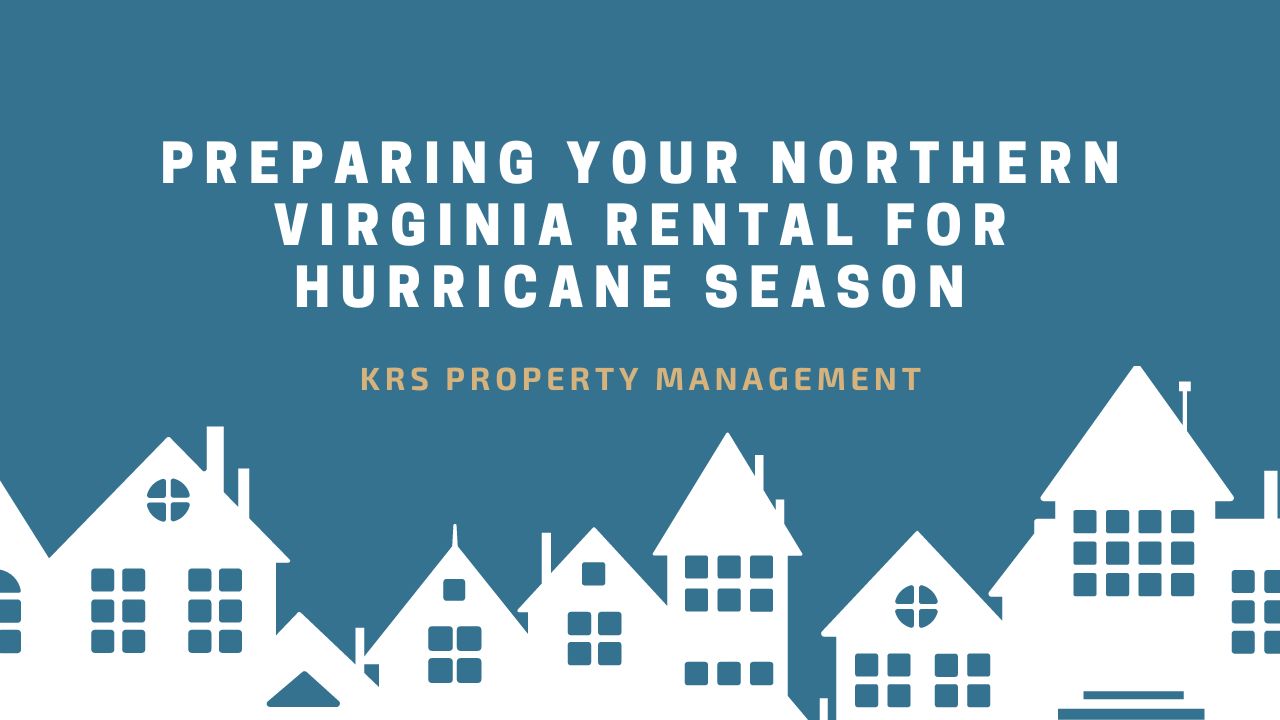
Landlords need to do a lot of things and preparing your Northern Virginia rental property for hurricane season is a crucial one. It protects your investment, while ensuring the safety of your tenants. The Atlantic Hurricane Season when hurricanes are most likely to occur, and it requires special attention and preparation from property owners.
This article provides a comprehensive guide to help you prepare your rental property for hurricane season, covering essential steps like ensuring proper insurance coverage, preparing for intense weather, and communicating with your tenants.
Understanding the Atlantic Hurricane Season and Its Start Date
Hurricanes are most likely to form in the Atlantic Ocean. The season officially starts on June 1 and ends on November 30. During this period, warm ocean waters and atmospheric conditions create favorable environments for the development of tropical storms and hurricanes.

As a landlord in Northern Virginia, it's important to be aware of this season and take proactive steps to safeguard your rental property against potential damages.
Steps to Safeguard Your Rental Property From Hurricane Damage
Verify Your Insurance Coverage for Hurricane Damage
The first step in protecting your rental property is to review your insurance policy to ensure it covers hurricane damages. Standard homeowner's insurance policies often do not include coverage for flood damage caused by hurricanes. You may need to purchase separate flood insurance through the National Flood Insurance Program (NFIP) or from private insurers.
Additionally, check if your policy covers wind damage, as strong winds can cause significant harm to your property. Make sure your coverage limits are sufficient to rebuild or repair your property if it suffers major damage.
Encourage or Mandate Renter’s Insurance
Encourage or require your tenants to obtain renter’s insurance. While your insurance will cover the structure of the property, it does not cover the personal belongings of your tenants. Renter’s insurance provides protection for tenants' personal property and may also cover temporary housing if the rental unit becomes uninhabitable.
By recommending or requiring renter’s insurance, you can help ensure that your tenants are financially protected in the event of a hurricane.
Get Ready for Strong Winds and Heavy Rain
Here are some measures you can take to get ready:
Inspect the Roof and Windows. Check the roof for loose or damaged shingles and ensure that windows are secure. Install storm shutters or impact-resistant windows to shield against flying debris.
Trim Trees and Secure Outdoor Items. Some tree branches that could fall on the property during high winds. Secure outdoor furniture, grills, and other objects that could turn into projectiles in strong winds.
Clean Gutters and Drains. Clear gutters to prevent from backing up and causing water damage to the roof and walls.
Reinforce Doors and Garage Doors. Install heavy-duty bolts or braces on doors and garage doors to prevent them from being blown in by strong winds.
Communicate with Your Tenants
Inform your tenants about the steps you are taking to prepare for hurricane season and provide them with information on how they can prepare themselves. Share emergency contact numbers, evacuation routes, and safety tips.
Encourage tenants to create their own emergency preparedness plans and to keep you informed of any damage to the property during or after a storm.
Advice for Emergency Preparedness
Being prepared for an emergency can make a significant difference in the outcome of a hurricane. This also ensures that unnecessary costs are not being acquired. Below are some tips for staying prepared:
Stay Updated
Keep track of weather forecasts and updates from reliable sources such as the National Hurricane Center (NHC) and local news channels. Sign up for emergency alerts from local authorities to receive real-time information about severe weather conditions, evacuation orders, and safety recommendations.
Develop a Plan
Develop a comprehensive emergency plan that includes evacuation routes, emergency contact numbers, and a communication strategy. Share this plan with your tenants and ensure they understand what to do in case of an emergency. Designate a safe location where you and your tenants can go if evacuation becomes necessary.
Assemble an Emergency Kit
Prepare an emergency kit with essential supplies that can sustain you and your tenants for at least 72 hours. The kit should include items such as water, non-perishable food, a first-aid kit, flashlights, batteries, a battery-powered radio, important documents, medications, and personal hygiene items. Encourage your tenants to prepare their own emergency kits as well.
Secure Your Rental Property
Take proactive steps to secure your rental property before a hurricane strikes. Board up windows, secure outdoor items, and ensure that the property is as safe as possible. Document the condition of the property with photos or videos before the storm to facilitate insurance claims if damage occurs.
Stock Up on Pantry Supplies
Keep a supply of non-perishable food and bottled water in the rental property. This can be especially important if your tenants are unable to leave the property due to severe weather or road closures.
Bottomline
Preparing your Northern Virginia rental property for hurricane season involves several crucial steps: ensuring proper insurance coverage, recommending renter’s insurance, preparing for intense weather, and maintaining open communication with your tenants.
By staying informed, making a plan, packing an emergency kit, and preparing your rental, you can significantly reduce the potential damage and ensure the safety of your tenants.
Property managers can help landlords with these preparations by providing expert advice on insurance coverage, assisting with tenant communication, and offering property management services that include routine maintenance and emergency preparedness.
Partnering with KRS Holdings, lets landlords like you feel confident that their properties are well-protected and that their tenants are well-informed during hurricane season.






